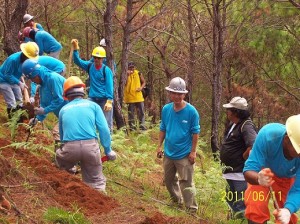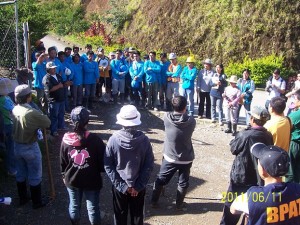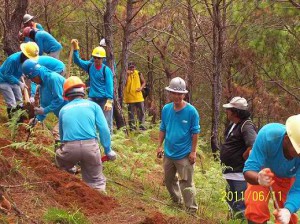By MICHAEL A. BENGWAYAN
 ON a cool sun-lit morning on June 11, more than 200 people converged in La Trinidad, Benguet with one thing in mind—to save a forest.
ON a cool sun-lit morning on June 11, more than 200 people converged in La Trinidad, Benguet with one thing in mind—to save a forest.
The full force was made up of students, singers, beauty contestants, bikers, government employees, Red Cross workers, and other professionals (some of them coming from Central Luzon, including Manila). Led by the nongovernment organization Cordillera Ecological Center (PINE TREE), they trudged to a pine forest armed with shovels, pickaxes, grub hoes, sickles, bolos, and knives.
The briefing volunteer from the center underscored to them their mission: “We will not merely plant trees. We will make sure they live. We will protect the slopes from erosion. We will save the soil, conserve water. We will make sure that forest is safe from fire. And that trees, small wildlife and birds will thrive freely”.
The forest they are trying to save is called the Longlong-Puguis Communal Forest, the most beautiful man-made forest in the region created by volunteers in the past 30 years.
“This forest is being eyed as the most promising eco-tourism site not only in the province but in the region in terms of financial rewards because of its amazing beauty, lush green trees and fern and grass meadows, fresh unpolluted air and untouched wild plants,” La Trinidad Councilor Arthur Shontogan said.
But he and the eco-warriors need more than their tools and wishful thinking if the forest is to survive.
Land speculators, politicians, organized squatting groups, and gardeners are all claiming a piece if not all of the 78-hectare pine-clad mountain.
Legal cases on its ownership have reached the Court of Appeals with the latest court decisions ruling in favor of the municipal government.
The local government has been fighting for the ownership and control of the forest since the time of former La Trinidad mayor Edna Tabanda and Benguet Governor Nesto B. Fongwan.
“Governor Fongwan was jailed because of his stand to protect this forest,” municipal environment officer Melchor Lando revealed.
 Fongwan, who was then La Trinidad mayor, marched to the lower court with some 200 students and a bishop to protest an earlier decision awarding almost half of the forest to a private person.
Fongwan, who was then La Trinidad mayor, marched to the lower court with some 200 students and a bishop to protest an earlier decision awarding almost half of the forest to a private person.
He ordered government lawyers to appeal the lower court’s decision which was later reversed by the Court of Appeals. The private claimants said they will elevate the case to the Supreme Court.
Other intruders, meanwhile, invaded the forest, and started building their houses.
“The municipal government had to ask the help of soldiers to evict the squatters who themselves were backed by policemen-relatives,” forest ranger Erwin Tuac said.
Why are the local officials and eco-warriors interested in the Longlong forest?
“The Longlong Forest is a potential breadwinner as well as symbolic of the town’s old glory days,” Shontogan said.
“The town can cash in on ecotourism activities, ranging from horseback-riding, eco-walks and camping. Ziplines can even be made across the forest, giving tourists an astounding experience as they view La Trinidad Valley,” Shontogan said.
But jumping at the eco-tourism bandwagon should be given a second thought, cautioned Oliver Masillem, head of the Ortigas-based engineering company Ground Specialists.
La Trinidad’s present condition is a far cry from what it used to be in the 1960s to 1970s. It was then clean, the river free of trash, gardens watered with spring water, mountains green with trees, and strawberries and vegetables free of harmful pesticides.
Today, La Trinidad could no longer live up to its image as the “Salad Bowl of the Philippines.”
The former town, now a municipality, is a victim of urban sprawl, policies gone awry and indecisive planning. Slowly, its vegetable gardens are being transformed into residences, commercial buildings and business establishments.
The air is now polluted with smog and whiff of pesticides. The Balili river that feeds the gardens, now carries trash, garbage and filth, including human excreta, that virtually makes it a biologically dying waterway.
The surrounding hills and mountains have gone bald and mushrooming with houses, both legally and illegally set up.
Ground Specialists has decided to help protect Longlong’s slopes, the first ever corporate action done for this forest. It also donated food and tools, paid for seedlings, and gave raincoats to park rangers.
For its part, the Cordillera Ecological Center provides training on soil and water conservation as well as seedlings for volunteers who want to help in preserving the forest.
But their efforts are not enough for threats to this forest still persist. Invaders recently burned about 10 hectares of forest area, intentionally killed newly planted trees, and put up signs, saying “We own this land.”
Still, the eco-warriors vow to continue their fight.
